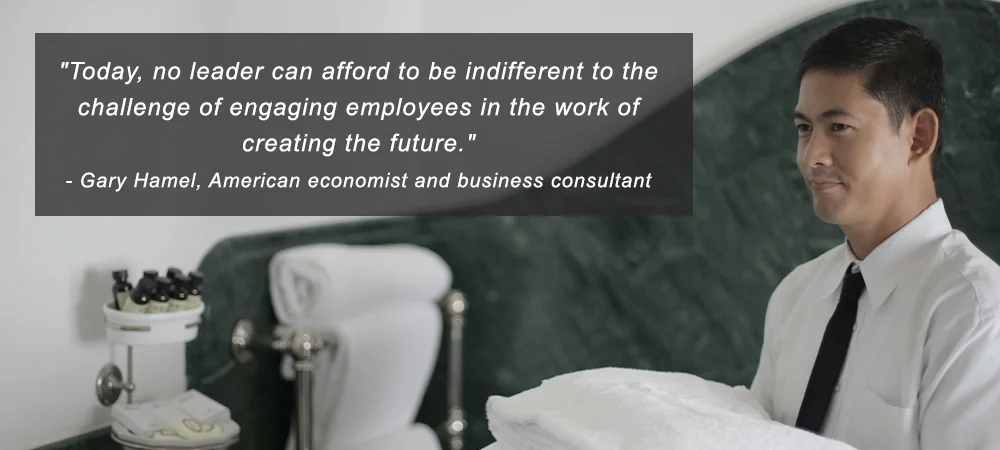Owners and marketers need to keep pace with the latest hotel trends because new technology, shifting social attitudes, demographic changes, and emerging economic realities fundamentally alter how hotels and their customers do business. In this article, you can learn more about the latest hotel industry trends for 2025.
Table of Contents:
- The Importance of Staying Up-to-Date With Hotel Trends
- 21 Important Hotel Trends for 2025
- 1. Sustainability
- 2. Staff & Labor Shortages
- 3. Personalization
- 4. Artificial Intelligence (AI)
- 5. Wellness and Spas
- 6. Unique Experiences
- 7. Emphasis on Safety and Hygiene
- 8. Wide Adoption Contactless Payments
- 9. The Deployment of Hotel Chatbots
- 10. Increased Adoption of Hotel Apps
- 11. Mobile Check-In Technology
- 12. Capitalize Fully on Voice Search
- 13. Smart Hotels
- 14. Increased Use of Hotel Robots
- 15. More Widespread Use of Voice Control
- 16. Implementation of Virtual Reality
- 17. Bleisure Travel
- 18. Remote Work and Digital Nomads
- 19. Augmented Reality (AR)
- 20. Hotels Enter the Metaverse
- 21. Authentic Localized Experiences
- What Are the Top Marketing-Related Hotel Trends?
- What Are the Top Technology-Related Hotel Trends?
- Learn About Hotel Trends Through a Hotel Course
- Hotel Job Boards and Employment Hotel Trends
- Hotel Energy Solutions: Why They’re a Top Trend
The Importance of Staying Up-to-Date With Hotel Trends
Keeping up-to-date with the latest hotel trends is vital for those working in the industry for several different reasons, with the most important being the ability to meet customer expectations.
As new trends emerge and new technology, processes, and procedures become commonplace, hotel guests start to anticipate and expect these things, and they can find it jarring if those expectations are not met. At the same time, hotels that do not keep pace with emerging trends can easily look out of touch or like they have been left behind.
More importantly, however, failure to stay familiar with and embrace hotel trends can provide rival properties with an unnecessary and significant competitive advantage. Guests value the customer experience above almost all else, and they will usually be more than happy to look elsewhere if you do not meet their requirements.
Table: Benefits of Keeping Up with Hotel Trends
Understanding the Factors Driving the Main Hotel Trends
Trends can be defined as generalized changes in behavior or the emergence and growth of new methods, approaches, or ways of doing things. Within the hotel industry, there are many different trends to be aware of, and these hotel trends are driven by several key factors, including the following:
Emerging Technology
Technology is a key driver of trends in most industries, and hotel trends are influenced by technology in this way too. For instance, voice control and voice search are helping to revolutionize the customer experience, while artificial intelligence is helping to improve personalization and the quality of customer support.
Lifestyle Changes
Another major factor influencing hotel trends is the broad lifestyle changes that have been seen across the world. In general, people are more aware of climate change and the role that human behavior has, which has led to greater demand for eco-friendly travel, sustainable food, and local rather than international tourism.
21 Important Hotel Trends for 2025
Hotel industry trends can be separated into two categories: general hotel trends, which are relevant at all times and which you will need to monitor continually, and some COVID-related trends, which are still in effect on both the travel industry and hotel management.
1. Sustainability
Sustainability has become a more popular hotel management trend in recent years, as today’s environmentally conscious customers demand choices that align with their ethics more and more. At the minimum, modern consumers often require that their hotels be as energy-efficient as possible.
However, consumers are increasingly searching for hotels where eco-friendly planning is a core feature. From ecologically friendly construction materials to passive heating or cooling and renewable energy sources, the eco-hotel trend looks set to be with us for a long time. Fortunately, this trend is good for hotels, too — eco-friendly initiatives often mean lower running costs in the long term.
Video: 10 Eco Sustainability Hotels
2. Staff & Labor Shortages
Another of the major hotel trends that managers and recruiters need to be aware of in the years to come relates to staff and labor shortages. In particular, as technology continues to evolve and as customer expectations continue to grow, there is likely to be a limited supply of labor with the necessary skills to navigate this new reality.
For hoteliers, there are two main options here. The first is to invest in training and coaching so existing staff can up-skill to the required level. The alternative is to try to make their hotel more appealing for workers to attract talent from other hotels or those with the right skills from outside of the hotel industry.
3. Personalization
Customers don’t like to feel that they’re just another anonymous statistic on a hotel’s balance sheet. Greater personalization in a hotel’s marketing makes consumers feel valued. It’s also more effective, targeting individuals with the precise offers that are likely to be most interesting.
Personalized marketing can be directed towards specific users — for example, a guest who had previously spent their summer break at a hotel can be contacted the following year to suggest they book another stay — or it can be aimed at consumers who fit a certain profile and meet a particular set of conditions.
Video: Personalization by Nicole Martin
You can read more detailed information and examples of personalization in the article “5 Ways Personalization Marketing Can Benefit the Hospitality Industry.”
4. Artificial Intelligence (AI)
Artificial intelligence is one of the most important hotel industry trends, transforming the sector in subtle but important ways. More and more businesses are using AI to handle some of their customer services, with simple but powerful chatbots providing support, fielding queries, and even taking care of the entire booking process. Combined with machine learning, these bots can effectively improve customer experience. Other AI applications include data analysis, making sense of customer information, and formulating marketing strategies. AI can deal effectively with large amounts of data that would overwhelm human analysts.
Video: The Impact of AI on improving hotel booking rates
Find more detailed information and examples of artificial intelligence use cases in the hotel industry in the article “How to use Artificial Intelligence in the Hotel Industry.”
5. Wellness and Spas
A greater emphasis on guest wellbeing has been one of the most notable hotel trends of recent times. This can take many forms, from providing on-site spas where guests can relax and rejuvenate to offering yoga classes, gym or sports facilities, massage treatments, and more.
Even in hotels with a relative lack of space for these kinds of facilities, some options are relevant for wellness, such as healthy snacks in hotel rooms. Some hotels even function as wellness retreats, allowing guests to escape some of their everyday bad habits and focus on boosting their minds and bodies.
Video: The Luxury Spa Hotel
6. Unique Experiences
Another of the key hotel trends to be aware of is the growing demand among customers for unique experiences. Again, the options here are plentiful, from organizing local tours or activities to hosting special events in your property. These events could be classes taught by renowned experts or opportunities to experience innovative technology.
Quiet or silent hotels have also grown in popularity, and these kinds of offerings are primarily based around peace, quiet, high-quality sleep, and the ability to unwind from everyday stress. Any unique experiences your hotel can provide will help set it apart from rivals and make attracting guests easier.
Video: The Rise of Sleep Tourism
7. Emphasis on Safety and Hygiene
Safety and hygiene measures are now one of the factors many customers will make their booking decisions because hotel guests are keen to minimize any unnecessary risks associated with traveling. While most businesses worldwide have gone back to normal operations regarding hygiene and safety, it remains a big part of the marketing and communications aspect for future guests.
Making sure the hotel shows cleanliness and its approach towards safety for guests is now an essential part of the marketing process, as customers are still very aware of the dangers of non-commitment to strict cleanliness protocols in hotels. These steps must be part of your hotel marketing strategies so that customers know about your efforts and guests feel safe during their stay.
Please check out “Tips to Highlight Safety in Marketing & Guest Communication” for further details.
8. Wide Adoption Contactless Payments
Contactless payment is an example of a hotel technology that has been around for a while but has gained extra significance after the coronavirus pandemic. This is because contactless payments limit the number of surfaces customers need to touch, protecting them and helping to keep your employees safe at the same time.
Contactless payments offer convenience, allowing customers to make payments more easily and quickly. Offering customers the ability to make contactless payments in as many areas of your hotel as possible can also be an effective way to enhance your cross-selling efforts and help in up-selling for hotel staff.
Video: How Contactless Payment Works
Read our “Tips for Contactless Payments Within Hospitality” post for more information.
9. The Deployment of Hotel Chatbots
Chatbots are another of the major hotel industry trends to be aware of. According to the Chatbots in Hospitality Industry Report by Zipdo, the global hospitality chatbot market size is projected to grow at a CAGR of 24.3% until 2027. They can be especially useful when the staff may be absent from other hotel operations and activities or during closed hotel office hours.
One of the best things about chatbots is their 24/7 availability. They can be used to increase direct bookings and provide automated support throughout the booking journey. They will also be able to interact with customers swiftly in multiple languages. Chatbots can also assist with upselling, cross-selling, and follow-up efforts too.
Video: Chatbot for Hotels
To learn more, look at the “Reasons Why Every Hotel Needs a Hotel Chatbot” article.
10. Increased Adoption of Hotel Apps
Hotel apps offer a range of benefits, and increased adoption is among the most crucial technology-related hotel trends to learn about. With the right hotel app, you can potentially improve communication with your guests, provide contactless check-ins, improve your room service and housekeeping, and boost your revenue.
In the “Hotel App: Optimize Your Guest Communication, Experience & Revenue” article, you can dive deeper into the topic of hotel apps, explore how they work, and learn how they can enhance the guest experience.
Video: Hotel App Demo
11. Mobile Check-In Technology Hotel Trends
Mobile check-in technology allows guests to benefit from a keyless entry method, removing the need to wait around at reception and obtain a physical key or key card. Instead, contactless check-in is available using a mobile app, and hotels can send users a unique entry code, allowing them to access the property and even their room.
This can help to streamline the check-in process and allow for more seamless arrivals and departures. As the check-in technology requires guests to download the hotel app, this can also be used to deliver important customer information or even promotional messages, allowing your hotel to easily up-sell or cross-sell.
A further benefit of mobile check-in technology is the absence of physical keys, which avoids situations where they are lost, damaged, or stolen. Instead, everything related to room entry will be controlled via a smartphone.
Video: Example Mobile Check-In
Read “Mobile Check-In App for Hotels: What Are The Benefits?” to learn more about Mobile Check-In Technology.
12. Capitalize Fully on Voice Search
Voice search is one of the biggest emerging trends in the travel industry. The rise of smartphone assistants like Siri and Alexa and the growth of the smart speaker market has helped increase the number of voice searches being carried out. This has then shifted customer expectations as a result.
Now, customers want the ability to book a hotel room using their voice alone. For this reason, both your website and your booking engine must be optimized to allow these bookings to occur. Failing to provide this option can result in other hotels taking guests who may otherwise have booked with you.
Video: Example How to Book a Room With Voice Search
Read “Voice Search: How the Hospitality Industry Can Benefit From It!” to learn more about Mobile Check-In Technology.
13. Smart Hotels
Smart hotels incorporate the Internet of Things (IoT) into their operation, using smart devices and systems to streamline the day-to-day running of the hotel, make things more efficient and improve guests’ experience. A smart hotel might use internet-enabled HVAC systems to fine-tune the temperature and ventilation in each room for maximum comfort and minimum energy waste.
According to the Smart Hospitality Market Report by Fact.MR, the global smart hospitality market is projected to grow at a CAGR of 22% until 2033. Smart hotels may also allow guests to use technology such as phone apps or voice control to operate heating, cooling, lighting, and entertainment systems more easily. Smart hotel rooms will likely see higher demand as more people use smart technology in their homes.
Video: Smart Hotel
You can read more detailed information and examples about how smart hotel rooms can benefit your hotel in the articles “Smart Hotel Room; What Are the Benefits for Hotel Owners and Guests” and “7 Ways to Transform a Hotel Room Into a Smart Room”.
14. Increased Use of Hotel Robots
The growth in the use of robots ranks among the most fascinating hotel trends, with different companies using robotics for different purposes. Some hotels have deployed robots in concierge roles, where they welcome guests and provide important information or where they can serve as the first point of contact for customer service purposes.
Yet, other hotels have gone further, using robots to provide room service, carry luggage, or assist with cooking food. Robots can also be used to reduce customer-to-staff contact, which can greatly save costs, and for housekeeping purposes, helping to clean rooms and generally boost hygiene levels.
Video: Alibaba’s ‘Future Hotel’ Uses Robots
Read “An Overview of Different Robots Used in Hotels” and “8 Examples of Robots Being Used in the Hotel Industry” for further details on how hotels use robots.
15. More Widespread Use of Voice Control
Another hotel trend that can be used to reduce customer contact with surfaces is the adoption of more voice control technology. This technology can be used within hotel rooms, for example, to control everything from the room temperature to the channel on the television.
Voice control has the added benefit of helping to improve the customer experience through convenience. Customers can potentially use smart speakers or voice-controlled hubs to access information from the internet or contact the front desk. You can also promote voice control technology in your marketing content.
Video: Example Voice Control Within a Hotel
Read the “How Can Voice Control Benefit the Hospitality Industry?” post to learn more.
16. Implementation of Virtual Reality
Regarding recent technology solutions, virtual reality must also be discussed. This allows users to experience a realistic digital version of a real-world location, which can be crucial for convincing customers to complete a booking.
Virtual reality tours can also be vital for booking weddings and business events because they allow customers to experience the facilities without needing to travel to see them in person. Tourists can also experience nearby tourist attractions, national parks, and hotel rooms. Modern VR tours can usually be carried out through a web browser, while the experience can be improved further if a VR headset is used.
Example: Atlantis Dubai Virtual Hotel Tour
Read “6 Reasons Why Every Hotel Should Have a Virtual Reality Video” and “How Virtual Reality (VR) Can Enrich the Hotel Industry” for more additional VR insights.
17. Bleisure Travel
The under-40s tend to be a fairly frugal demographic with a work-hard, play-hard approach to life. These traits have driven one of the most talked-about hotel industry trends to date: so-called bleisure (business/leisure) travel. Combining business and work with leisure travel, bleisure travel represents the best of both worlds.
Whether they’re extending a work trip to take advantage of the possibilities offered by a destination or just squeezing in a little sightseeing before or after work, Millennials are finding savvy ways to explore the world without taking time off work. Online work makes bleisure travel even more popular.
Video: The State of Business Travel — Bleisure Benefits
Find more detailed information about “Bleisure Travel” in the articles “What is Bleisure Travel?” and “Bleisure: Tips for Hotels to Attract More Bleisure Travellers”.
18. Remote Work and Digital Nomads
Remote work is the practice of people working from outside of traditional workplaces, usually via the internet. Some modern remote workers are known as digital nomads and they earn a living from almost anywhere they choose. Many hotels are used to dealing with corporate travelers, but the rise of remote work now means digital nomads are a target too. Hotels that provide features used by remote workers can gain an advantage over rivals.
Relevant hotel trends include the provision of high-end Wi-Fi, fast internet speeds and work equipment, like printers and photocopiers. Many hotels also provide meeting rooms, co-working spaces and work stations in guest rooms. Try to think of possible ways to make your hotel appealing to remote workers, who may want to stay for several weeks or even months. This could include providing rooms that have kitchens and other self-service features. It may also mean offering access to quiet spaces within the hotel, or expanding your room service offerings.
Video: Digital Nomads Explained
19. Augmented Reality (AR)
Augmented reality (AR) is a close cousin to virtual reality. Where virtual reality replaces the real world with audio and visual input to create an immersive experience, augmented reality adds virtual elements to the real world.
This could mean, for example, a smartphone app that displays listings, opening times, and other information about the business or attraction that a visitor is looking at. Hotels can use AR to provide interactive maps and information about services such as spas, gyms, restaurants, etc. Hotels also use AR games to make their guests’ visits more enjoyable and memorable.
Video: Example Augmented Reality Within the Hotel Industry
Find more detailed information and examples about how augmented reality can benefit your hotel in the article “How Augmented Reality is Transforming the Hotel Industry”.
20. Hotel Trends & the Metaverse
The rise of the metaverse is one of the most interesting and exciting hotel trends because it offers so much potential. Whether offering virtual spaces to guests, enhancing the real-world through augmented reality, selling NFT content, or promoting your hotel through virtual reality, there are many options to explore.
When guests are provided with opportunities to interact within virtual spaces offered by a hotel, it opens up the possibility of holding business meetings that are more engaging and personal, even if participants are physically located in different places. Offering metaverse options also allows hotels to promote themselves as metaverse hotels, likely appealing to the more technology-focused customer who wants to experience the latest innovations.
For more information about the metaverse and hotels, read “How Can the Hotel Industry Take Advantage of the Metaverse?”
21. Authentic Localized Experiences
Localized experiences are authentic experiences that are relevant to the local area, offered to hotel guests. This can include everything from local cuisine and local art on the walls, to participating in local traditions. These localized experiences are important because travelers often want to experience cultures that are different from their own. Owners and managers with an eye on key hotel trends should cater to these needs in authentic ways.
Localized experiences can help to give your hotel a unique selling proposition and will appeal to travelers who are not drawn to the obvious tourist traps. Using locally sourced ingredients in your restaurant and serving authentic local meals can reduce your carbon footprint, play a key role in your marketing and has the potential to help the local economy. Embracing local culture can also help to make a hotel feel like a real part of the community.
What Are the Top Marketing-Related Hotel Trends?
Within the wider category of hotel trends, there are a number of marketing trends that people need to be aware of. These include an increased focus on personalization, the rise of voice search, a general shift towards influencer marketing and content marketing, and the growth of chatbots.
You can explore hotel trends related to marketing in more detail, complete with explanations for why they are important, by reading the “Hotel Marketing; The Latest Trends in the Hotel Industry” article.
What Are the Top Technology-Related Hotel Trends?
Almost all hotels have now adopted contactless payment processing, and the Internet of Things (IoT) ensures that more properties can be considered ‘smart hotels’. In the years ahead, other emerging hotel trends will include robotics and virtual reality, while everyone will need to focus on cyber security.
You can read about some of the major hotel trends in the technology area and explore precisely why these trends are disrupting the industry in the “Hotel Technology Trends: Upcoming Innovations You Must Know” article.
Learn About Hotel Trends Through a Hotel Course
A great way to learn about the biggest hotel trends while also furthering your own career prospects is to complete a high-quality hotel course. The courses available focus on topics like management, marketing, finance, and more, and many will provide you with valuable qualifications.
To explore the topic of hotel courses further and learn about some of the main educators who deliver these courses, you can read the “Hotel Course: A List of Courses & Hotel Educators” article.
Hotel Job Boards and Employment Hotel Trends
Once you have built up an understanding of hotel trends, you can use this knowledge to assist you in finding a job in the industry. You can explore several channels here, with hotel job boards being the main ones. However, you can also find job vacancies on hotel websites and using social media.
To see a list of some of the biggest hotel job boards to utilize for your job search and learn about other channels to check out, read “The Best Hotel Job Boards to Boost Your Career”.
Hotel Energy Solutions: Why They’re a Top Trend
One of the most important hotel trends right now is the adoption of greener hotel energy solutions. When some people think of reducing energy consumption, they think of chilly rooms and dingy lighting. Nothing could be further from reality. In fact, implementing hotel energy solutions can make your hotel a brighter, more comfortable place to stay.
In “Hotel Energy Solution: Save Money and The Planet,” you’ll discover why reducing energy consumption is one of the top hotel trends today. The right solution can cut costs and reduce environmental impact while improving the guest experience.
Hotel Trends FAQs
Some hotel industry trends can seem baffling or intimidating at first. In many cases, though, they’re very accessible and can be implemented without major changes in how your business operates. Adopting the latest hotel industry trends is the best way to ensure your hotel remains competitive in a changing world.
Want to Learn More About Trends in Related Industries?
It is essential to be aware of all the upcoming trends in the hospitality & tourism-related industries. While some trends can affect multiple industries, some are specific to the industry. You can learn more about trends within different industries in the following articles.
- Revenue Management Trends: Discover the Latest Developments
- Hospitality Trends: The Latest Trends in The Hospitality Industry
- Travel Trends: Opportunities for the Travel Industry
- Tourism Trends: The Latest Opportunities for The Tourism Industry
More Tips to Grow Your Business
Revfine.com is the leading knowledge platform for the hospitality and travel industry. Professionals use our insights, strategies, and actionable tips to get inspired, optimize revenue, innovate processes, and improve customer experience.Explore expert advice on management, marketing, revenue management, operations, software, and technology in our dedicated Hotel, Hospitality, and Travel & Tourism categories.
This article is written by:
Hi, I am Martijn Barten, founder of Revfine.com. With 20 years of experience in the hospitality industry, I specialize in optimizing revenue by combining revenue management with marketing strategies. I have successfully developed, implemented, and managed revenue management and marketing strategies for individual properties and multi-property portfolios.










Leave A Comment